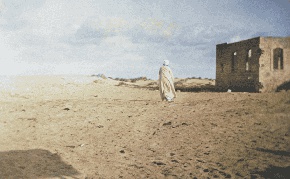The views expressed in our content reflect individual perspectives and do not represent the authoritative views of the Baha'i Faith.
For almost as long as history has been written, historians have wondered: Is there a driving force that propels history and, if so, what is it? In other words, what causes history to happen?
Over time, various theories have emerged, including this currently popular one: nothing much in particular.
Some contemporary historians, looking for trends or patterns, have reasoned that, with more than seven billion inhabitants on this planet and countless daily interactions among them, each influencing the global course of events, it is impossible to identify one overarching element that drives history. For these historians, there are simply too many random social, political, or economic factors at work in the world to pinpoint any one governing influence for history.
However, during the 19th century, at least two scholars believed they had zeroed in on historical causation. Thomas Carlyle (1795-1881), a historian, mathematician, essayist, and philosopher, coined the “Great Man” theory of history.
RELATED: The Dawn of a New Era in Human History
Carlyle and the Great Man Theory of History
In his book On Heroes, Hero-Worship, and the Heroic in History, written in 1841, Carlyle declared, “the history of the world is but the biography of great men.”
Carlyle was influenced by the historical impact of Napoleon Bonaparte (1769-1821). Napoleon, the emperor of France and leader of its armies during the Napoleonic Wars (1803-1815), not only changed the course of history in Europe, but wielded a power that extended far beyond the political and historical realm.
For example, he championed the metric system of measurement, first developed in France in 1799, which is now the predominant means by which most of the world calibrates distance, volume, and weight.
Furthermore, Napoleon had a direct hand in the formulation of the Napoleonic Code, the legal system which bears his name and is the most influential and widely used system for civil and criminal justice in the world. So, Thomas Carlyle had some powerful first-hand evidence to bolster his theory of history.
The Economic Idea: Marxist History
Carlyle was not the only 19th century writer who advanced a theory of history. Probably the most famous and influential person to write about the causes of history was Karl Marx (1818-1883). Marx took an entirely new approach to the matter, arguing that history was grounded in and dependent on economics – a theory known as “historical materialism.”
Under the Marxist historical theory, as human society evolved in stages from transient bands of hunter-gatherers to a pastoral period of farming and agriculture, and finally into an industrialized manufacturing and commercial civilization, the economic aspects latent in each of these phases governed those societies and formed the structure for their histories.
Thus, Marx theorized that the economic base of all human society, in whatever form it took, influenced its culture and customs, its laws and social ethos, and essentially wrote its history.
A Sacred Perspective on History
One more theory of history deserves our attention here, although the evidence supporting it is difficult to quantify. It has fallen out of favor with some contemporary academics because of the decline of the influence organized religion in what are now predominantly secular European and American societies.
The original theory of history was theological – that a Supreme Being controls and directs events, creating history. This “theophanic model” is fundamental to the doctrine of Christianity and all western religions. “Are not two sparrows sold for one farthing?” Jesus asks in the Book of Matthew in the New Testament, “And yet, not one of them falls to the ground apart from your Father’s will.”
The Baha’i Faith both accepts and expands on this theological basis for history. According to Baha’i belief, human history is influenced by the Creator through the selection of prophets and divine messengers, and their insertion into the world at critical moments in its history.
RELATED: Does Humanity Need Universal Educators?
“He hath ordained that in every age and dispensation a pure and stainless Soul be made manifest in the kingdoms of earth and heaven,” Baha’u’llah wrote. He continued:
Led by the light of unfailing guidance, and invested with supreme sovereignty, They are commissioned to use the inspiration of Their words, the effusions of Their infallible grace and the sanctifying breeze of Their Revelation for the cleansing of every longing heart and receptive spirit from the dross and dust of earthly cares and limitations.
These spiritual messengers have a two-part mission – first, to renew God’s spiritual influence and energy in humanity by establishing new belief systems; and second, to reveal fresh divine doctrine that helps humanity mature and progress toward a higher level of morality and spiritual development. Certainly the prophets and founders of the world’s great Faiths – among them Krishna, Abraham, Moses, Buddha, Zoroaster, Jesus Christ, Muhammad and now Baha’u’llah – have had enormous, lasting impacts on humanity and its history. Their profound influence, unlike most historical figures, has lasted for centuries, impelling the creation of entire civilizations.
In the next essay in this two-part series, we’ll examine that influence and its effect on our history.
















Comments
Sign in or create an account
Continue with Googleor